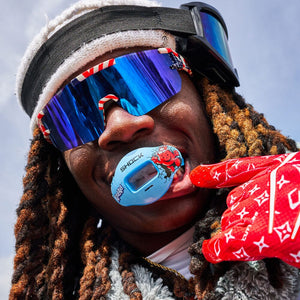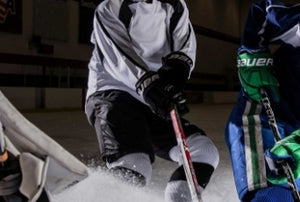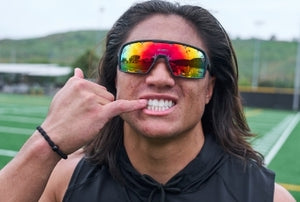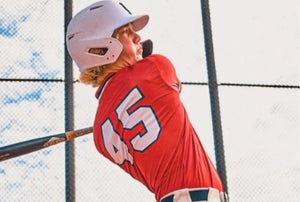Looking to become the next big thing in hockey? You'll need to learn what it takes. Hockey is a tough and demanding sport, and easily the most physical professional sport there is (outside of combat sports). Let's take a look at what you need to become world-renowned in the sport of hockey. We will cover it all from physical preparedness, skating ability, mouthguards and more.
Skating Ability
Mobility is a key factor in hockey performance. If you can excel at starting and stopping, turning and crossovers well, the rest of the game comes easier. In order to make the awesome plays or prevent your opponent from making plays, you have to be able to move! Here are some traits to look for in the prototypical hockey player:
Speed
Speed is a major factor. The ability to skate fast will create openings and allow a player to score while on offense. On defense, you want to be quick and prevent the opposing team from capitalizing on any fast break plays that can leave your goalie vulnerable. Having more bodies protecting your goal is the best-case scenario. "Be first" is a mantra that you hear many coaches use with their players in hockey and other sports alike. Always be the first guy back on defense, always be the first guy leading the pack on a fast break play.
Balance
Balance is a critical component of skating ability and hockey in general. Without balance, the quality of your shots and passes will suffer. You can be the best passer in the world while stationary, but if you cannot do it while moving then it will benefit you very little throughout a hockey game. Balance can make the difference between wiping out on the ice and scoring the game-winning goal at the buzzer. If your balance isn't the best, make sure to put in work and focus on that first.
Passing Ability
Knowing how to make a pass and when to attempt a pass is a key element in hockey. Let's not forget that hockey is a team sport. A team that moves the hockey puck in a fluid manner will be harder to beat. A hockey player with great passing ability can take on the role of a playmaker, which is just as important as being able to score. Consistently moving the puck keeps the defense on their toes and can set up scoring better than letting a single player handle the puck at all times. Here are a few tips for setting up a successful pass:
- Know when to pass the puck. Look for cues from your teammates that they are open and ready for a pass.
- Make sure to pass the puck to where the player will be, not where they are in that present moment. They should be moving when they catch a pass. Make them sprint towards the pass to prevent the defense from intercepting the puck.
- Keep the puck on the ice as much as possible. Passes that go airborne may be more difficult for a teammate to receive.
Physical Preparedness
When the going gets tough, physical preparedness (or lack thereof) matters and players will start to display what they're made of. Over time, postseason games and highly-contested games are where things start to get serious and fitness levels come into play. General physical preparedness deals with the development of speed, strength, power, flexibility, and endurance. A lack of physical preparedness in athletes leads to injuries.
Conversely, being in great physical condition will also help prevent injuries.Recent studies performed by our military demonstrate that individuals with less physical preparedness have to work harder than their counterparts and put in more effort. Individuals with better fitness levels can perform an activity for a greater amount of time with less of a perceived effort. They fatigue less rapidly and have a greater reserve capacity for additional tasks.Compare the military's findings to the demands on the ice. Plenty of injuries are seen in postseason games due to fatigue. In professional hockey, the regular season lasts 82 games.
Beyond that, you have the postseason, in which each round is decided by the victor of a "best of 7" series, which means that the road to a championship can potentially last 110 games!Consider the fact that all of these games take place within a nine-month span. That means that professional hockey players on average have about 2 and a half days in between each game. Let's not make the mistake of calling these rest days because they can be anything but restful. Players still have to practice in between games and possibly put some time in the gym to keep in shape.
With a grueling hockey season to deal with, players must remain in peak condition if they want to avoid injuries and play at their best consistently. Unfortunately, the injuries are seemingly inevitable. "If you make it this far and you don't have any injuries or anything wrong with you, I'm sure you're not really playing up to playoff hockey," Blackhawks forward Patrick Kane said when asked about injuries leading up to the playoffs. No one is invincible, but a fit player in good health will be able to recover more quickly than a person in poor condition. Simply put, fitness levels cannot be overlooked.
Vision
The greatest players in team sports are those who have good vision. Hockey is extremely similar to basketball and soccer in the sense that the game is played very quickly and any player on the field can make a play. The best playmakers seemingly have eyes in the back of their head. Their awareness is on a different level. A hockey player with good vision can scan the rink quickly and react based off of what they see. A hockey player needs to be vigilant and aware of what their team is doing, as well as the defense.
Being able to find the open man every time will guarantee success on the ice.Good vision starts with awareness and understanding of the game. Aside from being vigilant, a player wants to have all of the team's plays memorized and be able to recognize the potential opening to run a play when they see it.
A Dynamic Approach
A dynamic approach is a consequence of good vision. There's no one approach or strategy that will always prevail. A good player/team will be reactive and play according to their situation. Your best player may be having an off night, so having the vision and the ability to step up and win the game despite difficulties will surely get a player noticed.
Generally, hockey teams will pick a team captain. If you're hoping to become noticed in the world of hockey but you weren't elected team captain, you will find comfort in knowing that you still have a chance to steal the spotlight. Regardless of how skilled a player is, we are all human and we all have bad days. When your star player has a bad night, it sets up an opportunity for another teammate to come along and steal the spotlight.
Next time things just aren't working out for your team, step your own game up and figure out new ways to offer more to the team. A player who demonstrates to his coach that he is capable of doing more will earn greater responsibilities and get noticed. Rest assured that if your coach doesn't recognize you putting in your full effort, another coach will come along who does.
Nutrition
Never underestimate the importance of good nutrition. As the level of competition rises, every aspect of a player's game must be examined. The old saying "you get out what you put in" definitely applies here.Given the demanding schedule of professional hockey, players seeking the highest level cannot afford to skimp on nutrition. A well-balanced diet is essential to avoid any nutrient deficiencies. Replenishing fluids and minerals lost during games and practice is also critical.
Some players can forget that regardless of the cold temperatures in the ice rink, they will still sweat. While sweating, players can lose vital minerals that support muscular contraction, energy production, strength and cardiovascular performance. These nutrients need to be replenished if a player wants to perform at their best.Aside from the micronutrients discussed above, we need plenty of macronutrients as well.
Hockey is a very active sport that burns plenty of calories. Your muscles will soak up carbohydrates and store them as fuel but once the tank is empty, performance will start to decline. A diet rich in micronutrients and complex carbohydrates will serve a hockey player well.
Intensity
Hockey is not exactly a laid-back sport. Studies have shown that while watching a hockey game, a fan's heart rate may even double! Having a chip on your shoulder doesn't benefit you in most situations, but I am going to go out on a limb here and say that it is an asset in hockey. Given hockey is the only sport outside of combat sports that allows fighting (minor penalties apply), you can expect most hockey games to become gritty, so be sure to wear your hockey mouthguard!
A good hockey player will have a combination of intensity and toughness. They should be comfortable with laying the opposing team out. They also have to accept that they will be on the receiving end of blows as well.
Staying Healthy
To become the best, you have to be able to play and train consistently. An injured player will not be able to play at full capacity or even play altogether. While we've covered fitness levels for staying healthy, we also have to touch on hockey protective gear.
Due to the gritty nature of hockey, it goes without saying that wearing hockey protective gear such as a mouthguard is necessary. A recent study shows that blows to the teeth with a hockey stick are very common and can result in a fractured tooth. The study also demonstrated that those who wore a hockey mouthguard can reduce their likelihood of dental fracture by 90%.
The Hustle
There's a saying that goes, "Hard work beats talent when talent doesn't work hard." This not only holds true in hockey but life in general. If you want to get noticed in the hockey rink, you have to hustle. Talent aside, the guy who works the hardest will do the best.You may not be the most talented player on the ice but if you are willing to outwork them, you can log better performances and get noticed. Not all of us are born with an affinity for hockey but if you're willing to work hard and practice for thousands of hours, you can do anything!
This means staying after practice is over to work on your hockey drills and putting extra time in the gym to work on your strength, balance and cardiovascular endurance. It also means that you will have to make sacrifices. While others are hanging out at the bar, you will be in the gym and you may have to miss some family events like birthday parties, etc. so that you can make it to practice or put in that leg workout. The output is a direct result of your input. If you want to get further, then you will have to push further.
Take into account all of the topics we discussed here if you want to elevate your game and become known as a hockey star. Some of these skills or characteristics you will have naturally. For the others, always remember to hustle! We wish you the best of luck. Play hard and stay safe.




